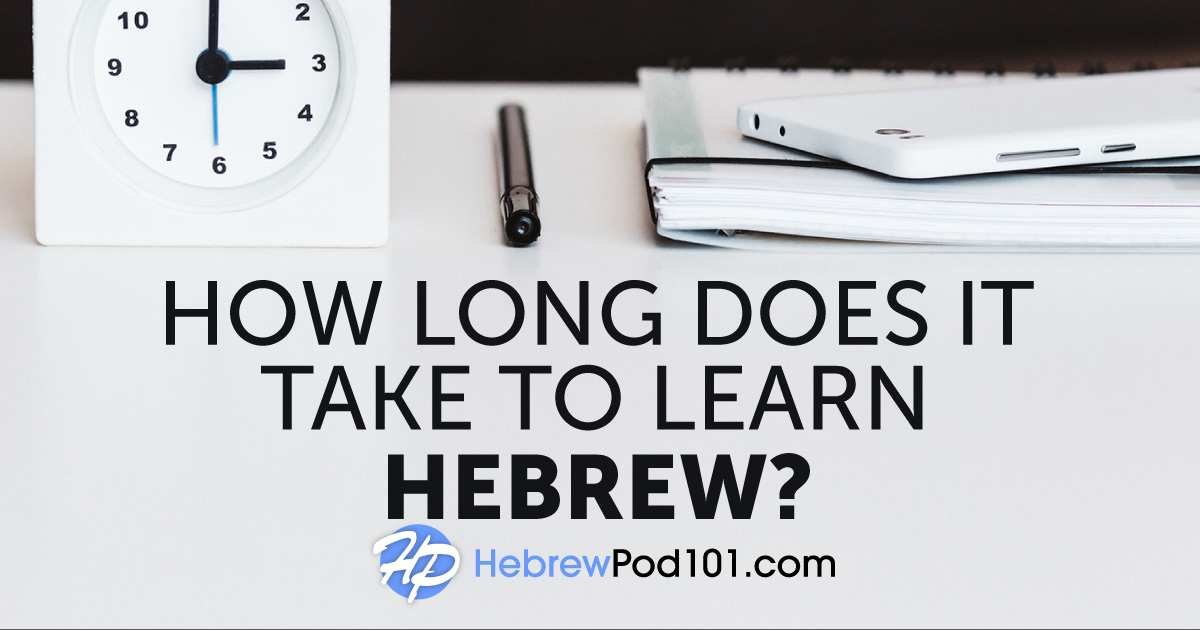
How long does it take to learn Hebrew? This is an altogether common question for people interested in picking up this ancient, vibrant, and wholly unique language.
No two students are alike, so the answer to this question will vary based on who you are and how you go about studying. For example, if you already know how to read the Hebrew alphabet, you’ll surely progress much faster than someone starting from scratch. Or if you’re able to do immersion learning in Israel, you’ll likely progress more quickly than someone learning in a place where they can’t engage with Hebrew day and night.
Of course, motivation is one of the most central factors in determining how fast you progress with a language. For instance, if you’re learning Hebrew in order to land a new business contract—or better yet, to impress a girl or guy you met at a party—you’ll likely find yourself progressing at a faster clip than someone who, say, has to learn Hebrew because their parents think it’s important for them to be able to read prayers or the Torah.
In any case, today we’ll be looking at:
- Factors that can influence your learning speed
- The essential skills you’ll need to reach the beginner, intermediate, and advanced Hebrew proficiency levels
- Some helpful tips on how to learn Hebrew fast
We’ll also talk about how long you can expect it to take you to reach each of these levels, though the numbers can vary quite a bit from one language learner to the next. Without further ado, let’s have a look at how long it takes to learn Hebrew.
 Table of Contents
Table of Contents
- Factors That Can Influence Your Learning Speed
- Beginner Level
- Intermediate Level
- Advanced Level
- Top 10 Tips to Help You Learn Hebrew Faster
- Let HebrewPod101 Get You on the Fast Track to Hebrew Learning
Factors That Can Influence Your Learning Speed

Before we look at each level and what it entails, let’s look at some more general factors that are likely to influence your learning speed.
Motivation
As mentioned previously, your motivation level is going to be reflected in the speed at which you progress with your Hebrew studies. Generally speaking, an intrinsically motivated student, meaning someone who is learning Hebrew out of his or her own personal choice, is going to find it much easier to advance. This is because there’s a lot of satisfaction to be found in achieving something you set your mind to. Plus, you’re typically going to be able to use Hebrew for a specific goal, which can be very gratifying, indeed.
Chances are, if you’re reading this lesson, you already have some reason for wanting to improve your Hebrew. But even if that isn’t the case, try to set your eyes on smaller goals that you can keep at the front of your mind as you study. This will help keep you motivated as you progress through your stated goals and feel that sense of accomplishment. For example, you may want to be able to sing along with a Hebrew song you like or to read Hebrew without nikkud. Keep your goals realistic for your current level, rather than overshooting it!
Your language(s) going in

One thing that’s going to make a huge difference in terms of how fast you progress with Hebrew is the language(s) you speak going in. Because Hebrew is a member of the Semitic language family, you’ll be more comfortable with the way Hebrew works if you speak any Arabic or Farsi, for example. This is because these languages share common traits (such as being read and written right to left) and comparable grammar logic.
English speakers are unlikely to find any foothold here, as they would with Germanic or Romance languages. Hebrew is altogether distinct from these language families and really bears no resemblance to English (other than all the loanwords it has from English, Latin, and other international languages). You may well recognize individual words, but don’t expect this to get you too far. At the end of the day, you just have to accept that the Hebrew language has its own separate character, rules, and approach to expressing the world.
Your linguistic abilities and experience in general
Another key factor is any prior experience you have with languages. For example, if you grew up bilingual or polyglot, you’ll likely have a leg up on someone who is monolingual—even if none of the languages you know are Semitic! This is partly due to something known as “tolerance for ambiguity,” a term that refers to a language learner’s willingness to accept and assimilate language features that differ from what s/he knows from her/his native tongue(s).
Moreover, if you’ve ever studied a language before, whether Hebrew or any other language foreign to you, your prior experience is likely to have some bearing on how you approach your Hebrew learning. For example, if you had good language teachers in school who inculcated healthy learning habits and gave you an overall positive language learning experience, you’re likely to have an easier time taking up a new language. On the other hand, if you had lousy teachers, you may be somewhat traumatized from these experiences and need to develop new habits and a new attitude toward language learning.
How and where you’re studying

As we said in the introduction, immersion studying is always going to be ideal, but it may not be a possibility for everyone who wants to learn Hebrew. If you can find a way to spend time in Israel, you’ll be able to benefit from constant exposure to the Hebrew language through interactions with other people, listening to the news, watching TV, etc., all in Hebrew. However, if you can’t physically go to Israel, try your best to boost your exposure to Hebrew by taking advantage of the wealth of media available online. For example, you can check out Hebrew-language Netflix series, Hebrew songs on YouTube, and even Hebrew-language forums.
Apart from location, it will be beneficial to have some sort of structure to your learning. This will help to ensure that you progress in a linear fashion, building your knowledge successively and acquiring all the skills you need in one level before running ahead to a more advanced one. It will also prevent you from feeling like you’re drowning in an overwhelming sea of information, without knowing how to progress.
It’s always a good idea to vary your learning, as well. We recommend using a mix of serious and fun learning materials (for example, grammar lessons vs. lessons on slang), as well as giving all four language skills (reading, writing, speaking, and listening) equal attention. Of course, there are some situations where you may need to hone only one or two skills. For example, in an academic setting, you may only need to be able to read Hebrew (and not produce it). Or maybe you simply want to learn conversational Hebrew and have little interest in learning to read it. In such cases, you may want to focus only on the necessities.
Beginner Level
The beginner level is just what it sounds like. This level describes someone who is in the initial phases of acquiring the Hebrew language.
The US Foreign Service Institute (FSI) groups world languages into four different categories, with Category I languages being the most similar to English and Category IV languages being the least similar. They have ranked Hebrew as a Category III language, meaning it has significant linguistic and/or cultural differences from English. Languages in this category are estimated to require 44 weeks (or 1100 hours) in order to reach “General Professional Proficiency” in speaking and reading. This would be equivalent to Intermediate Level on HebrewPod101.com.
Extrapolating based on this projection, the average time it takes to reach the beginner level might be something like 22 weeks (or 550 hours), if we assume that the beginner level is halfway to the intermediate level.
At the beginner level, the assumption is that you’re building up a lot of passive knowledge, but obviously with the goal of being able to apply it and produce language (i.e. speak or write) more and more as you progress.
Wondering how to learn Hebrew from scratch? Here’s a list of skills and abilities you’ll want to master as a beginner:
The alphabet – אלפבית (alefbeyt)

As Hebrew does not use the Latin alphabet, you’ll need to learn to read the 22 characters of the Hebrew alphabet. To make things more complicated, Hebrew is an abjad, meaning that vowels are not letters but diacritical marks placed above, below, or within the letters, which are all consonants or vowel-bearing placeholders. To make it just a bit more complicated, these diacritical marks, called ניקוד (nikkud), are almost universally omitted from written and printed Hebrew and therefore need to be deduced from context. However, many learning materials include them for the benefit of the student reader. One last complication is that Hebrew uses one script for print and another for handwriting, so you’ll probably want to learn both of these.
Basic verbs
Verbs are action words, so you won’t see much action without them! The good news about Hebrew verbs is that there are only three main tenses—simple past, simple present, and simple future—and there’s no verb “to be” in present tense. The bad news is that there are a whopping seven conjugation patterns to learn.
Male and female forms
One of the aspects of Hebrew that tends to be particularly tricky for speakers of non-gendered languages, such as English, is the fact that Hebrew uses male and female forms for nouns, pronouns, adjectives, and verb conjugations.
Talking about yourself

At the beginner level, you’ll learn how to introduce yourself and how to say basic things about yourself, such as where you’re from and what you do.
Saying hello and goodbye
You won’t get very far without these essential skills.
Countries, nationalities, and languages of the world
The beginner level is a great place to learn these, starting with your own country of origin, nationality, and language(s). Once you have those down, you can progress to other countries, nationalities, and languages so that you can also talk about other people in this regard.
Likes and dislikes

As a beginner, you should learn to express basic likes and dislikes, as well as things like your hobbies and pastimes.
Food and drink
In Israel, we love food! So, no basic Hebrew-language education would be complete without learning how to discuss food. This includes verbs, nouns, and adjectives for eating, drinking, ordering at a restaurant, etc.
Work and school
You’ll also want to know how to talk about work and school, including the vocabulary for different professions and careers.
Numbers and time

Finally, numbers and the related topic of telling time are also essential for the beginner level. Note that Hebrew also has male and female forms for numbers, so you’ll want to master this, as well.
Intermediate Level
As you progress, you’ll move on to the intermediate level, which is where many students feel comfortable staying. At this level, which, as mentioned, might take around 44 weeks (1100 hours), you’ll already be getting much more comfortable holding a basic conversation and generally defending yourself in Hebrew.
Here’s a list of skills and abilities you’ll want to acquire at the intermediate level of Hebrew:
Dealing with travel situations
Because this is an essential skill set that draws on various abilities, you should get to a certain level of comfort when handling travel situations. This includes things like taking a taxi and buying bus tickets, as well as asking for and even giving directions.
Writing simple texts

At this level, you should be able to produce simple texts, such as short text messages and emails or brief descriptions.
Describing things with some detail

At this point, you should also be acquiring sufficient vocabulary. This includes not only nouns and verbs, but also adjectives and adverbs which will permit you to describe experiences, plans, and opinions with some level of detail and precision.
Reading and understanding more complex texts

You should be able to read and comprehend more complex texts such as news items or technical articles in fields you’re familiar with, such as those related to your profession. Much of this, of course, will have to do with vocabulary acquisition.
Have lengthier, more complex conversations
Again, as you progress in your ability to understand speech spoken at native speeds, and as you build up your own ability to speak with fluency, you should be able to engage in more interesting and drawn-out conversations.
Advanced Level
First of all, it should be noted that there really isn’t a limit to the advanced level. While there is a distinction in terms of skills and abilities when compared to the intermediate and beginner levels, you can take the advanced level just about as far as you wish—even to the point of achieving what’s known as near fluency.
So, how long does it take to learn Hebrew fluently? A conservative estimate might be something like 2 years, though a really motivated and talented student might get there as soon as, say, 18 months.
Here’s a list of skills and abilities that pertain to the advanced level of Hebrew-language study:
Understanding longer and more demanding texts or conversations
As you grow your vocabulary and improve your grasp of things like grammar and syntax, you should be able to fend for yourself even when reading complex texts such as full-length books, opinion pieces, and even poems and song lyrics. You should also be able to engage in lengthy and complex conversations, such as discussing your opinions on politics or talking about technical matters.
Expressing ideas comfortably and in a fluid manner

By now, you should feel comfortable expressing most of your thoughts and ideas with fluency, which in the literal sense means that your speech flows, without much stuttering, hesitation, or searching for words.
Effectively using language in social, academic, and professional situations
Your broad vocabulary, improved grammar, and stronger rhetorical abilities should enable you to feel comfortable using language in functional settings, such as at work or school, or in making and getting to know friends…or even that special someone.
Writing well-structured, detailed texts on complex topics

Assuming you’re focusing on writing and not just speaking, you should now be able to write more complex texts, such as essays and full-length letters or emails. You should have a solid grasp of different registers (e.g. formal vs. informal) and when to employ them.
Top 10 Tips to Help You Learn Hebrew Faster
Regardless of your current level or your language learning goals, there are several things you can do to make the most of your study time. Here are our top ten tips for how to learn Hebrew faster!
1. Read both with and without vowels to practice word recognition.
This is obviously going to be more important at the beginner level (and perhaps the intermediate level, to some extent), as the expectation is that by the time you reach the intermediate level, you’ll have become comfortable reading without vowels. That’s why it’s important to start practicing this ability as early as possible.
2. Keep track of vocabulary.
Record new words as you go, using a notebook or even your phone. Also, quiz yourself regularly to make sure you’re retaining this vocabulary.
3. Make sure to talk to native speakers, and ask them to correct you.

This is obviously much easier to do if you’re physically in Israel, but even if you’re not, you should do whatever it takes to find some native speakers in your town or online. This way, you can practice speaking Hebrew with someone who can offer you helpful feedback on your use of the language.
4. Watch and listen to plenty of media in Hebrew.
One of the best and most enjoyable ways to improve your Hebrew is to take advantage of the wealth of media available, particularly online, in the Hebrew language. Watch Hebrew TV shows and movies, and listen to Hebrew music as much as you can, especially with subtitles in Hebrew (see below).
5. Study with a partner.

This may not be for everyone, but many people find that a study partner can be a great way to get mutual encouragement. It can also help with any anxiety when it comes to speaking. Obviously, it’s always best to try to find someone who is more or less at the same level of proficiency as you are.
6. Be willing to make mistakes.
Numerous studies have shown that the most successful language learners are those who go easy on themselves. Making mistakes is part and parcel of learning languages, so don’t just allow for this—expect it. Learn to laugh at yourself when you make a silly mistake, rather than getting caught up on it.
7. Don’t be embarrassed to ask questions.

According to a Hebrew proverb, a bashful person makes for a poor student, and a strict person makes for a bad teacher. Part of any successful learning endeavor is a sense of comfort about asking questions whenever you’re in doubt. So when in doubt, ask someone for help!
8. Practice pronunciation in front of the mirror.

This will probably feel funny at first, but by actually watching what your mouth is doing when you speak, you have a better chance of honing in on the mechanics of producing the right sounds to approximate native-sounding Hebrew. In the same vein, pay attention to what you see Israelis’ mouths doing when they make any sounds you’re having difficulty with, and do your best to mimic them when you practice.
9. Do karaoke in Hebrew.
This one’s a no-brainer. Not only is it fun to let loose in front of the karaoke screen, but actually singing a song to beat is a great way of drumming language into your head—literally.
10. Use subtitles to help connect words to sound.

Subtitles are your friend. They’re a fantastic tool for working on anything, from expanding your vocabulary to recognizing words without vowels to picking up on grammar and syntax structures.
As a beginner, you’ll likely need subtitles in your native language, but as you progress, you can use subtitles in a more challenging way. An intermediate student, for example, can pick up a lot of new words by watching TV or movies in his/her native tongue, with Hebrew subtitles to accompany it. As you advance, however, challenge yourself to watch Hebrew-language TV shows and movies with Hebrew subtitles. This can go a long way toward helping you connect the physical appearance of words with the sounds they make.
Let HebrewPod101 Get You on the Fast Track to Hebrew Learning
As you can see, there are many components to tackle in mastering the Hebrew language. We at HebrewPod101 are proud to offer you a broad array of learning materials to ensure that you learn comfortably and at as fast a pace as you desire.
Whether you prefer audio lessons or written ones like this one, our library of materials is diverse and designed with the optimal student experience in mind. In addition to our learning materials, we also offer numerous lessons addressing tips and techniques to make your learning more efficient and more enjoyable.
Is there anything else you’d like to know about the process of learning Hebrew? Feel free to get in touch and let us know.
Until next lesson, shalom!










